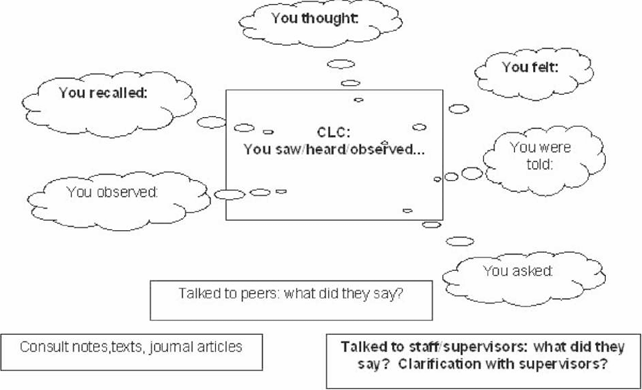
Appendix 1 Ideas for reflective journals/diaries
 المؤلف:
Pauline Cho & Catherine Tang
المؤلف:
Pauline Cho & Catherine Tang
 المصدر:
Enhancing Teaching and Learning through Assessment
المصدر:
Enhancing Teaching and Learning through Assessment
 الجزء والصفحة:
P365-C30
الجزء والصفحة:
P365-C30
 2025-08-06
2025-08-06
 386
386
Appendix 1 Ideas for reflective journals/diaries

Questions that may help you in your preparation of your Reflective Diary/Journal:
•Did you identify areas/issues that you were unclear of, or disagreed with your supervisors/peers, or different from what you learned in your past lectures? Did you clarify with your supervisors or peers about the issues identified (If not, why? Are your action justified? Did this help you in your learning etc. SELF ASSESSMENT)
•What actions did you take and what are the results (what did you learn)?
•What did you learn about yourself with regard to your learning attitude, your knowledge about CL practice? (You need to be frank and honest in your entries. If you did not, why? Talk about how you felt, your fears etc.. How could you or staff help you overcome these fears?)
•What have you learned from interacting with others (peers/supervisors/staff etc)?
•Have you been open to share with others and to listen what others have to say?
•How is practice different from theory? (Did this exercise help you to understand your theory and the application of theory better? How? Why? etc...)
•Did you learn anything that helped you to better understand a theory, the use of a test that you were taught in lectures/ labs?
•What did you learn that were not taught in lectures (e.g. communication with patients), and how did you cope or learn more about this to improve your performance? Or how can this be incorporated into lectures?
•What did you learn from writing this reflective journal? Did your peers gain anything from YOUR involvement in this exercise and vice versa?
•Have you paid attention to both your strong and weak points? (Can you identify them...?)
•Did you learn that different situations call for different strategies in management? (CLC)
•How did CLC/supervision/RW help you in your clinical experiences in relation to your professional growth? (eg. did it encourage you to be more independent, to become more confident in professional activities and behaviors etc)
•What has helped you most in doing this RW? Did this exercise help you identify areas that need to be changed, improved etc..... in yourself/peers/staff/clinical training etc... Why and how?
•What were your feelings doing this exercise - did you find it helpful? challenging? enjoyable? change the way you learn? (how, why and why not?). Were your feelings different from your peers? Why?
•Did this exercise help you to remember or recall later other aspects of previous experiences that you had forgotten?
•Did this exercise encourage and facilitate communication?
•Did this exercise lead to a deeper appreciation of your learning process and increase your awareness of how you learn?
•Etc........
 الاكثر قراءة في Teaching Strategies
الاكثر قراءة في Teaching Strategies
 اخر الاخبار
اخر الاخبار
اخبار العتبة العباسية المقدسة


